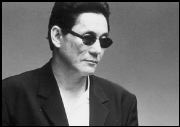BROTHER
written and directed by Takeshi Kitano with “Beat” Takeshi, Claude Maki, and Omar Epps opens July 27 at Varsity
COOL IS NOW an import-export market. We send Bruce Willis abroad and get Jean Reno in return. That cinematic balance of trade is why the mordantly violent flicks of “Beat” Takeshi Kitano are gaining a cult audience. Less expressive than Clint Eastwood in his prime, laconic Kitano here plays a yakuza henchman arriving in L.A. to find his half-brother, Ken (Claude Maki), who turns out to be an Americanized petty drug dealer running with Denny (E.R.‘s Omar Epps). Quicker than you can say sushi out of water, Kitano’s blas鬠slouching thug Yamamoto blasts his improvised new gang to criminal ascendancy. “I’m at war in America, too,” he tells a fellow yakuza who later joins them.
Just like the good old days? Not exactly, since no one here is prepared for Yamamoto’s decisive, offhand violence. (We see some of the old country in flashback, where Yamamoto’s fatalism is perfectly consistent.) “I’m supposed to die,” he laughs—the ultimate tough guy, but with Kitano’s typically whimsical flashes of humor. The director makes this latter-day Scarface a deadpan joker, not a psycho, but as with last year’s Kikujiro, the humor doesn’t always translate. Dour Yamamoto takes up with an unlikely, bubbly girlfriend, yet as Ken explains to Denny, their boss never shares his private life with the gang. (Frustratingly, neither does Kitano, the boss, feel obliged to share that subplot with us, the audience.)
Kitano’s first film to be (largely) shot in America remains obdurately foreign—and not because it’s Japanese. Rather, Kitano’s volatile mix of violence and sentimentality simply fails to ignite such a familiar plot. When the gang finally, disastrously goes up against our own Mafia, the Italian-American stereotypes beg parody. Instead, Kitano relies on his same old charismatic persona in a land where crime stories require fresh new blood.








